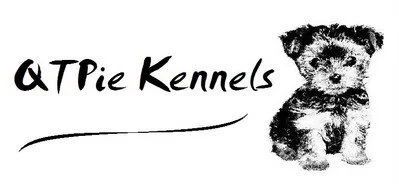|
A common law of nature that should be adhered to when breeding is the 'survival of the fittest'.
Breeding yorkies in South Africa however, has proven to be exactly the opposite, as often the smallest and weakest pup is chosen for further breeding purposes. (see the article on teacups, most commonly requested when buying a Yorkie)
Check if there is any inbreeding, and ask about the parents health history.
If possible examine the parents yourself.
Any dogs with serious defects (such as joint issues, dry eye, hypoglycaemia, one testicle and other abnormalities) should not be used as stud dogs.
There are some common health problems that you will come across in most small dog breeds, for example:
Low Resilience
This is due to the size of the dog and often a smaller dog will have fewer reserves and therefore a disease can take its toll a lot faster than on a larger dog. Keep an eye on your dogs behaviour patterns and don't hesitate to take him to the vet when you are concerned, you may very well save yourself a lot of heartache and a fortune on vet bills.
A small dog may not suffer from chronic hypoglycaemia, but this can be caused by retching or diarrhoea or some eating disorder. In such cases smaller dogs will most likely suffer from hypoglycaemia (low blood sugar levels) more readily than larger dogs.
First aid for a dog in this state would be to give him an electrolyte in place of his drinking water and to get him to the vet ASAP.
Bad Teeth (Can a Yorkie chew Bones)
It does not matter whether the breeder insists that the Yorkies he breeds do not have tooth problems, it is still something every Yorkie owner should watch closely and check on regularly. Sometimes, and it happens often with Yorkies, that the vet needs to remove their milk teeth. Soft human food often adds to the problem of bad teeth.
Dental chews can be very good, especially those that include enzymes, but still check your dogs teeth regularly. You may have to start brushing his teeth routinely along with his grooming, if his teeth are still deteriorating brush his teeth more often. Twice a week is usually more than often enough.
If the teeth have been neglected, do not hesitate to take him to the vet, they will put him under aesthetic and clean his teeth and remove any that are a problem, giving your dog a new lease on life.
Gum disease, as in humans, can cause all kinds of further health problems, and it must feel awful to have a sewer in your mouth.
Brushing
Use dog toothpastes, since they are made to be swallowed, and it tastes better than human toothpastes do -
so you should have an easier time brushing their teeth. Choose a toothpaste that contains enzymes if possible.
Use a baby toothbrush that fits on your finger for the small little dogs or another soft bristle toothbrush. Google
|
|
|
